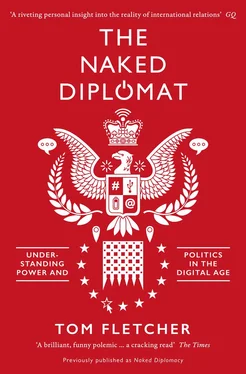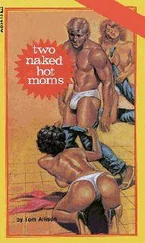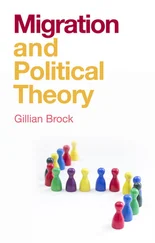But the more important message of the review was that in the Digital Age we need to move our organisations away from prioritising competences, hierarchy and inputs and towards those based on skills, networks and outputs. I hope the future Foreign Office will be less male and pale, more digital, more expert, and more flexible. The buccaneering diplomats on the walls of King Charles Street will soon be joined by portraits of pioneering modern diplomats: the first female and minority ambassadors; the local staff who keep embassies running when events force UK colleagues to flee; the consular staff who rescue Brits in the most difficult of circumstances.
I am now trying to apply similar lessons to innovation at the United Nations. How can we use solar drones for better peacekeeping and provision of education? How can we create digital citizenship to increase security and reduce identity fraud and international crime? How can we use social media to engage and build a new generation of global citizens? How do we build the online rights to match the offline rights we have codified? How do we overhaul the global system for humanitarian giving? How do we respond to the challenges and opportunities of artificial intelligence? We need to find new ways to make the huge amounts of great work done by the UN more meaningful and accessible to the public. That takes more than a hashtag and a civil society side event. And leaders need to get much better at executing global policy, not simply announcing it.
Fourth, a successful century depends on us winning the argument for openness. There will be a temptation to pull up the drawbridge and focus purely on domestic security or nationalist politics. Let’s be in no doubt: a retreat from the world is the path to irrelevance and drift. Our national interest now depends on our internationalism. Countries are strongest when outward-looking, pioneering, exploring, welcoming. So we must marshal our best national instincts and values, and not our worst. In the battle with more isolationist and intolerant opponents, we have to show that our societies have not themselves become intolerant or isolationist.
This is not just posturing. We need a world view based on actually viewing the world, because our ability to keep pace with the dangerous political and social implications of technological change depends on our brightest minds coming up with ingenious solutions to problems, from climate change to economic instability. We should be unashamedly backing freedom of the Internet, so that the smartest people in the world can create together the extraordinary ideas that we don’t yet know we need. We should be proud when our countries are magnetic, and smart enough to recognise the economic potential of migrants and refugees, from Einstein to Jobs. We were all migrants once, and the twenty-first century might make us migrants again. This will be a century of people on the move: improved communications, the Internet, climate change and conflict will create more migration than any previous era. So we need to learn how to absorb, assimilate, coexist.
However insecure we will feel at times in the coming period, the answer to modern security threats is in fact more liberty, equality, fraternity. Not less. Or as Benjamin Franklin put it at a time of similiar uncertainty: “those who would give up essential Liberty , to purchase a little temporary Safety, deserve neither Liberty nor Safety.”
The gadgets we marvel at today will not seem marvellous for long. The changes we wonder at won’t seem wonderful for long. The predictions we think are crazy won’t seem crazy for long. At moments in 2016, it appeared that technology had disrupted democracy. But used properly it still gives us the means to tackle inequality, improve cyber and economic security, outsmart the extremists, ensure that artificial intelligence helps not harms us, and make it easier for citizens to be part of government.
But that all depends on us – whether we are just connected to technology or can truly connect with each other through that technology. Because Facebook and Twitter didn’t create our desire to connect. Our desire to connect created Facebook and Twitter.
Progress zigzagged in 2016. So what can citizen diplomats 7do in response?
We can build networks in a time of institutional failure; consensus in a time of arguments; and bridges in a time of walls.
We can strive for expertise, patience, perspective and judgement in a time of fake news, sound bites and echo chambers.
We can aspire to be courageously calm, tolerant and honest in a time of outrage, intolerance and post-truth politics.
We can be internationalist in a time of nationalism, and open-minded in a time of closed minds.
Above all, we must remain curious in a time of too much certainty.
I’m now an ex-Excellency, a recovering ambassador. But I stand by my original conclusion – we need to forge a renewed spirit of global citizenship.
Diplomats will play our part. But naked diplomacy is too important just to leave to diplomats.
*Perhaps it is appropriate in a post-truth year that there is no strong evidence that either Twain or Shelley actually made these observations.
PREFACE
The Diplomat Who Arrived Too Late
Shen Weiqin was the diplomatic adviser to Emperor Qin Er Shi during China’s Qin dynasty. It was a pretty cushy job, with steady access to the many pleasures of the royal court, a fair amount of arduous but interesting travel, and long periods of relative peace in which to study, opine and schmooze.
Shen knew his master’s mind and his master’s foibles, and was well suited to the role we now call a ‘sherpa’, the key adviser who helps the leader prepare for diplomatic summits. In modern statecraft, the sherpa’s assistant is called the yak, a metaphor that would also have meant something to His Excellency Shen Weiqin. The modern yak carries the mountains of paper generated and required by any modern diplomatic negotiation. Shen’s carried him.
Shen must have anticipated a routine month’s work as he set out for the Congress of the Tribes in Xianyang in 208 BC. His emperor’s armies had soundly thrashed the Chu tribe, burying alive all those who surrendered. This is what we now call hard power, though the Geneva Convention discourages such treatment of defeated opponents.
The victory left the field open for a strong peace treaty that would give Qin increased taxes and land rights, and the opportunity to recruit any remaining Chu warriors to fight for him. This would have been straightforward and probably routine business for Shen, who by this time had negotiated three such deals with the unburied survivors of other defeated clans.
Making peace is easier when you have shown you can make war. As he carried out his restorative and silver-tongued victor’s diplomacy, Shen was an early example of the statecraft that President Theodore Roosevelt aspired to many centuries later: ‘Speak softly and carry a big stick.’ Only the choice of weapon was more deadly.
But Shen was to be rudely awakened from his diplomatic comfort zone. The envoys representing the Chu tribe had developed a new and innovative means of passing messages quickly, by positioning rested horses along the key trade routes. This was the third-century BC equivalent of a decent social media account. As a result, they had gathered intelligence of an uprising in the west and of disquiet within Emperor Qin’s ranks, caused by the despotism of his favourite and most intimate adviser, the flamboyant eunuch Zhao Gao (who deserves his own book). Shen’s diplomatic opponents were able to use this crucial information to hold out for a much better deal than they would otherwise have got.
Shen had been outmanoeuvred at his own game. In modern language, his diplomacy had been disrupted. The chastened and no doubt increasingly saddle-sore envoy returned with trepidation to his master to report the bad news.
Читать дальше












